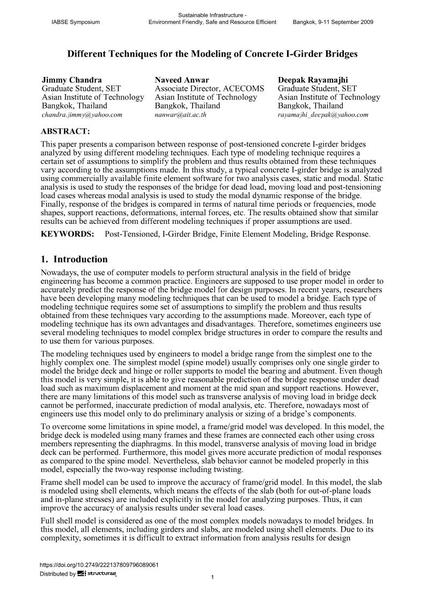Different Techniques for the Modeling of Concrete I-Girder Bridges

|
|
|||||||||||
Bibliographic Details
| Author(s): |
Jimmy Chandra
Naveed Anwar Deepak Rayamajhi |
||||
|---|---|---|---|---|---|
| Medium: | conference paper | ||||
| Language(s): | English | ||||
| Conference: | IABSE Symposium: Sustainable Infrastructure - Environment Friendly, Safe and Resource Efficient, Bangkok, Thailand, 9-11 September 2009 | ||||
| Published in: | IABSE Symposium Bangkok 2009 | ||||
|
|||||
| Page(s): | 136-145 | ||||
| Total no. of pages: | 8 | ||||
| Year: | 2009 | ||||
| DOI: | 10.2749/222137809796089061 | ||||
| Abstract: |
This paper presents a comparison between response of post-tensioned concrete I-girder bridges analyzed by using different modeling techniques. Each type of modeling technique requires a certain set of assumptions to simplify the problem and thus results obtained from these techniques vary according to the assumptions made. In this study, a typical concrete I-girder bridge is analyzed using commercially available finite element software for two analysis cases, static and modal. Static analysis is used to study the responses of the bridge for dead load, moving load and post-tensioning load cases whereas modal analysis is used to study the modal dynamic response of the bridge. Finally, response of the bridges is compared in terms of natural time periods or frequencies, mode shapes, support reactions, deformations, internal forces, etc. The results obtained show that similar results can be achieved from different modeling techniques if proper assumptions are used. |
||||
| Keywords: |
finite element modeling (FEM) Bridge Response I-Girder Bridge
|
||||
